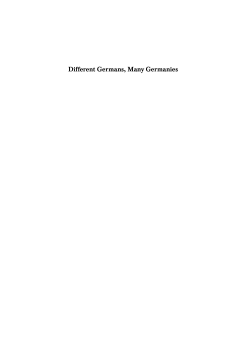
Additional Information
Book Details
Abstract
As much as any other nation, Germany has long been understood in terms of totalizing narratives. For Anglo-American observers in particular, the legacies of two world wars still powerfully define twentieth-century German history, whether through the lens of Nazi-era militarism and racial hatred or the nation’s emergence as a “model” postwar industrial democracy. This volume transcends such common categories, bringing together transatlantic studies that are unburdened by the ideological and methodological constraints of previous generations of scholarship. From American perceptions of the Kaiserreich to the challenges posed by a multicultural Europe, it argues for—and exemplifies—an approach to German Studies that is nuanced, self-reflective, and holistic.
Harald Wenzel is Professor of Sociology at the John F. Kennedy Institute for North American Studies of the Freie Universität Berlin. His research focuses on sociological theory, the sociology of mass media, religion, and catastrophes. Publications include Die Abenteuer der Kommunikation: Echtzeitmassenmedien und der Handlungsraum der Hochmoderne and George Herbert Mead zur Einführung.
Karin Goihl is Academic Coordinator of the Berlin Program for Advanced German and European Studies at the Freie Universität Berlin. She holds an M.A. in North American Studies and Linguistics from the Freie Universität Berlin and has served the Berlin Program since 1998.
“Although the book is not intended as a history of modern Germany, advanced students will discover many tantalizing perspectives in what outsiders see as German as well as the German response. With this publication, Berghahn Books remains the strongest source for quality academic publications addressing all aspects of German studies… Highly Recommended.” • Choice
“The trajectories and transformations examined in this ambitious and thought-provoking volume deserve a wide readership.” • German History
“Creative dialogue is palpable in the pages of this rich collection. Together, its chapters make important scholarly contributions to twentieth-century German history and to transatlantic history.” • Michael Kimmage, Catholic University of America
Konrad H. Jarausch is the Lurcy Professor of European Civilization at the University of North Carolina at Chapel Hill. He has written or edited some fifty books on modern German and European history. He has co-directed the Zentrum für Zeithistorische Forschung in Potsdam and co-founded the UNC Center for European Studies. His most recent book is Broken Lives: How Ordinary Germans Experienced the 20th Century (Princeton University Press, 2018).
Table of Contents
| Section Title | Page | Action | Price |
|---|---|---|---|
| Different Germans, Many Germanies | iii | ||
| Copyright | iv | ||
| Contents | v | ||
| Figures and Tables | vii | ||
| Preface | viii | ||
| Introduction | 1 | ||
| Part I. Responses to Modernity | 23 | ||
| Chapter 1. A Modern Reich? | 25 | ||
| Chatper 2. The Dual Training System | 53 | ||
| Chapter 3. The German Forest as an Emblem of Germany’s Ambivalent Modernity | 70 | ||
| Chapter 4. Health as a Public Good | 87 | ||
| Part II. Democratic Transformation | 105 | ||
| Chapter 5. Antifascist Heroes and Nazi Victims | 107 | ||
| Chapter 6. The Pen Is Mightier Than the Sword? | 137 | ||
| Chapter 7. Human Rights, Pluralism, and the Democratization of Postwar Germany | 158 | ||
| Chapter 8. African Students and Racial Ambivalence in the GDR during the 1960s | 178 | ||
| Part III. Searching for a New Model | 199 | ||
| Chapter 9. The German Model in Renewable Energy Development | 201 | ||
| Chapter 10. Germany’s Approachto the Financial Crisis | 220 | ||
| Chapter 11. Dreams of Divided Berlin | 239 | ||
| Part IV. Global Implications | 257 | ||
| Chapter 12. Inventing the German Film as Foreign Film | 259 | ||
| Chapter 13. Atlantic Transfers of Critical Theory | 278 | ||
| Chapter 14. Nation and Memory | 298 | ||
| Index | 315 |
